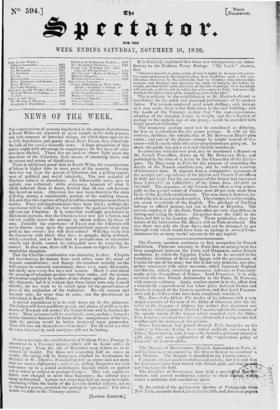Progress towards the establishment of Uniform Penny Postage is announced
ill a Treasury minute, which will be found entire in another page. From the 5th of December next, letters are to be charged by weight. For those not exceeding half an ounce in weight, the charge will be fourpence, whether its destination be Shetland or St. Alban's ; if exceeding half an ounce and not more than one ounce, eightpence ; and so on, adding fourpence for each half-outice up to a pound avoirdupois, beyond which no packet will be taken as subject to postage-charges. This rule applies to letters now charged at more than fourpence ; the inferior rates being undisturbed. Letters not exceeding half an ounce in weight, circulating within the limits of the London district delivery, are to be charged a penny, provided the postage is "pre-paid." For other details we refer to the Treasury minute. It is distinctly explained that these new arrangements are intro- ductory to the Uniform. Penny Postage. "My Loris" observe, that
" However desirable in many points of view it might be to carry into execu- tion contemporaneously the complete plan, the:r Lordships, upon a full con- sideration, have come to the conclusion that by adopting some intermediate measure, and bringing into operation the mode of charging the letters by weight, previous to the entire redaction of the rate of postage, their Lordships will not only avoid the risk to which the other course is liable, but muter;ally. facilitate time introduction of the remaining parts of the plan." The machinery in the establishment at St. Martin-le-Grand is 111SOfileielle for the quick and punctual perffirmance of its present
duties. The pet-sons employed need much drilling ; and, strange as it may seem, there is too little room in the vast building ; and. the Lords of the Treasury declare that " the contemporaneoun
adoption of the charging letters by weight, and the reduction of postage to the uniform rate of one penny, would be attended with much practical difficulty."
The fourpenny postage must not be considered as delaying, for less as a substitute for, the penny postage. It will, on the
contrary, facilitate the introduction of Mr. ROWLAND HILL'S plan entire ; and part of the change—charge by weight instead of dis- tance—will be made while tile other preparations are going on. In short, the public has got a real and valuable instalment.
Li connexion with our own post, may be mentioned a Report on the French Post-office, drawn up by Mr. RO \VIAND Him, and
published in the form of a letter to the Chancellor of the Exche- quer. Mr. HILL went to Paris for the purpose of examining the details of the French establishment, and he collected a variety
of instructive facts. It appears from a comparative statement of the receipts and expenditure of the British and French Post-offices in 1821 and 1837, that the net receipts of the former had increased from 1,393413.51. to 1,669,7981.; of the latter, from 481,2467. to.
767,9461. The expenses of the French Post-office, owing princi- pally to the greater extent of France, were 20 per cent. more than those of the English establishment. The sum named, however, in- cludes the whole cost of mail-coaches. The charges, levied by weight, are about two-thirds of .the English. The privilege of fi-aolung belongs to official persons, but not to Peers or Deputies. The.
persons employed in the Paris Post-office are very expeditious in sorting and taxing the letters. Altogether there are 1,017 in the Paris, and 996 in the London office. These particulars show the nature of the information Mr. limes visit to Paris produced. His stay there was only six clear days; and yet he managed to get through work which would have been an apology to several Com- missioners for as many weeks' sojourn in the gay capital.


























